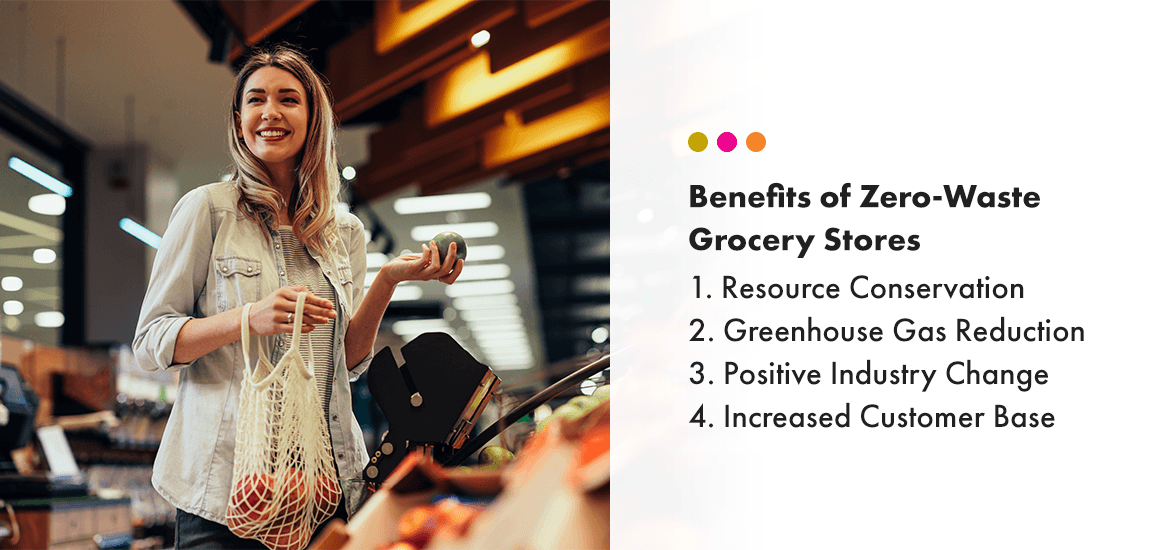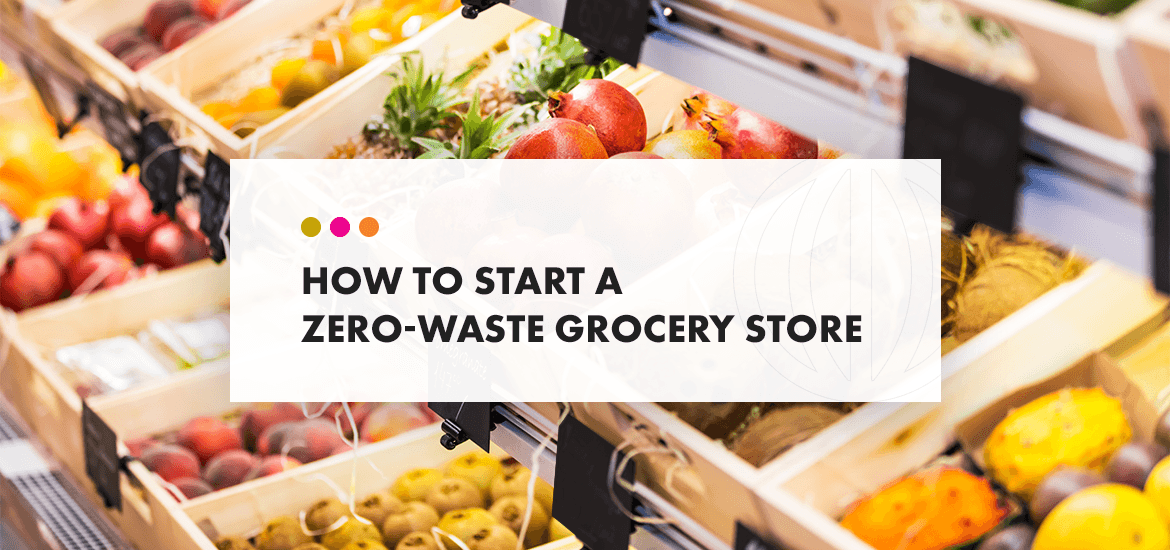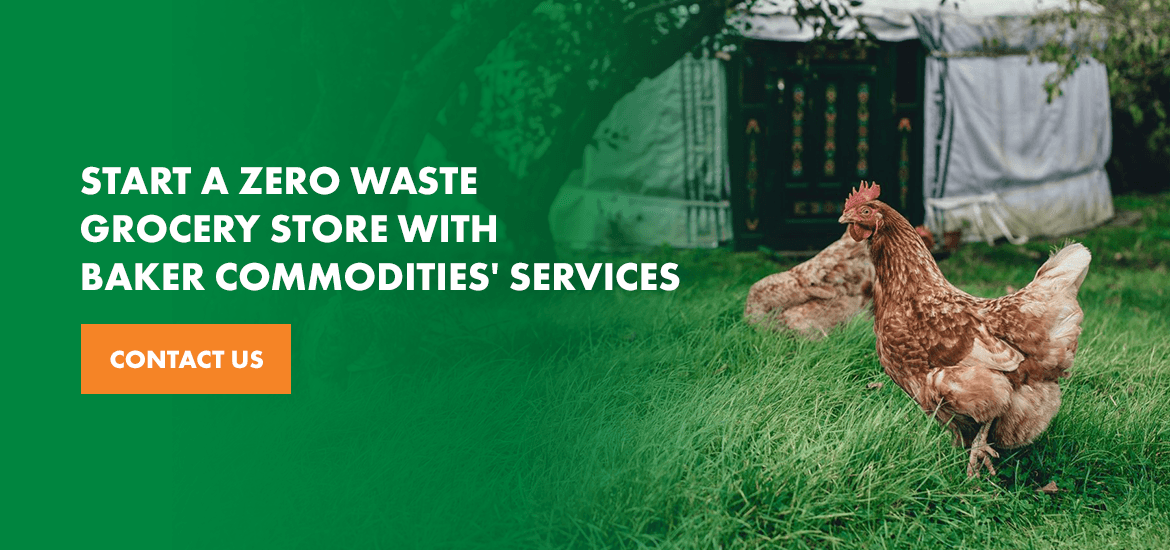How to Start a Zero-Waste Grocery Store
Table of Contents:
- What Is a Zero-Waste Grocery Store?
- Benefits of Zero-Waste Grocery Stores
- Are Zero-Waste Shops Commercially Viable?
- How to Start a Zero-Waste Store
Starting a zero-waste grocery store is an excellent way to impact the environment positively. Reducing single-use plastic packaging and food waste can help you decrease your store’s contribution to landfills, reduce pollution and attract environmentally-conscious consumers.
Whether you want to open a new zero-waste grocery store or transition your current shop to a zero-waste grocery store, understanding how to accomplish this effectively can increase your success.
What Is a Zero-Waste Grocery Store?
A zero-waste grocery store eliminates most or all food waste and packaging from store operations. It is a sustainable shopping solution that benefits the environment by reducing landfill waste. The goal of zero-waste grocery stores is to break production and consumption cycles that negatively impact the environment.
Benefits of Zero-Waste Grocery Stores
Opening a zero-waste supermarket allows you to positively impact your community and the environment with the following benefits:
1. Resource Conservation
Zero-waste supermarkets conserve natural resources and reduce pollution. Single-use products such as food packaging waste resources and pollute the environment.
A no-waste grocery store combats single-use product usage by eliminating plastic food packaging, which reduces the number of plastic items accumulating in landfills. This sustainable shopping solution also conserves natural resources by repurposing food waste such as animal by-products.
Eliminating plastic packaging also encourages consumers to reduce food waste. By purchasing unpackaged produce, consumers can buy smaller amounts of fruit and vegetables, allowing them to take only what they need and decrease the amount of food they waste at home.
2. Greenhouse Gas Reduction
Starting a zero-waste grocery store can help protect the environment and climate from harmful greenhouse gases. Plastic packaging materials and processed food emit greenhouse gases into the atmosphere, and these gases can negatively affect global climate patterns. Eliminating or reducing plastic packaging items and repurposing animal by-products helps to reduce the greenhouse gases released into the atmosphere.
3. Positive Industry Change
While opening one zero-waste grocery store may seem like a small change in the larger grocery industry scope, it can lead to larger advancements.
Each zero-waste grocery store that opens reduces the amount of single-use items manufacturers need to produce, decreasing demand for these items. As demand decreases, production decreases, too.
Starting a zero-waste grocery store can also inspire other shop owners or grocery chains to follow the example and take the same positive measures.
4. Increased Customer Base
Zero-waste grocery stores attract environmentally conscious consumers. These individuals make efforts to reduce waste, and they often support businesses that make similar efforts. Zero-waste grocery shopping allows consumers to make a difference, and many individuals appreciate the opportunity to do so.
Sustainably minded shoppers often seek supermarkets that take positive actions to reduce their carbon footprint, so you can attract more customers by opening or transitioning to a zero-waste grocery store.

Are Zero-Waste Shops Commercially Viable?
Zero-waste stores are as commercially viable as other stores. It may take a couple of years to start earning a profit, but this is true for any type of new or transitioning business. Specifically, opening a zero-waste shop can help you attract more customers and save money on single-use items, the latter of which can be a notable expense for other kinds of grocery stores.
How to Start a Zero-Waste Store
Opening a new zero-waste grocery store or transitioning an existing supermarket to a zero-waste store requires planning and preparation. You can begin the process with the following tips:
1. Plan to Sell Whole Foods and Imperfect Produce
Whole foods are the best options for zero-waste grocery stores. While prepared meals are convenient and tempting grocery items, pre-packaged meals create significant amounts of plastic waste. Selling whole foods such as produce, grains, rice and pasta allows you to provide your consumers with unpackaged, healthy meal ingredients.
You should also stock produce that individuals typically perceive as “ugly.” Traditional grocery stores usually remove discolored or misshapen produce from their shelves to make them more attractive, but this wastes food that’s still edible. Stock your shelves with imperfect produce and place signs above them to educate your consumers.
2. Avoid Overstocking
Grocery stores often overstock their shelves to prevent customers from leaving empty-handed, but you should avoid overstocking to reduce waste. You can increase your stock slightly if you notice a particular food item often sells out quickly, but try to only order what you predict your consumers will purchase.
3. Gather Packaging Alternatives
Because zero-waste grocery stores decrease or eliminate plastic packaging, they store and sell food in reusable containers. These containers allow customers to gather food items in desired portions to purchase and take home. To sell unpackaged food items, you need the following containers:
- Bulk bins
- Large stainless steel jars
- Large glass jars
- Gravity dispensers
4. Encourage and Provide Reusable Shopping Containers
Encourage shoppers to bring reusable shopping bags and containers for gathering food items and taking them home. Not all consumers consider or remember to bring their own reusable items, so you should also provide these items for sale or rent in your store. Providing reusable shopping bags and containers enhances the shopping experience and provides an additional source of profit when consumers purchase them.
5. Take Advantage of Technology
Technology can help you reduce waste in your check-out lines and your marketing efforts. Invest in a system that allows you to send digital receipts instead of printed ones to reduce paper waste. You can also replace paper signs with digital signs, and you can utilize social media to advertise your perishable items and sell them faster.
6. Recycle Animal By-Products
Animal rendering reduces waste by repurposing animal by-products. The North American Renderers Association considers approximately 50% of butchered animal parts to be inedible. Recycling animal by-products such as fat allows you to reduce waste in landfills and send it where it’s useful.
Companies can use animal by-products to create useful commodities such as:
- Personal care products
- Fuel
- Fertilizer
- Animal feed
- Solvents
- Clothing
Start a Zero Waste Grocery Store With Baker Commodities’ Services
Starting a zero-waste grocery store positively impacts the environment. No-waste supermarkets reduce plastic waste, repurpose animal by-products and provide your community with sustainable shopping opportunities.
Baker Commodities offers animal rendering services to help businesses repurpose animal by-products. We collect and transport animal by-products to environmentally friendly rendering facilities. At these facilities, we process the by-products and use them to produce commodities such as fuel, fertilizer, animal feed, industrial product bases and personal care items.
Rendering animal by-products is an important part of starting a zero-waste grocery store. Contact us to learn more about our rendering services and how we can help as you open a zero-waste supermarket.




